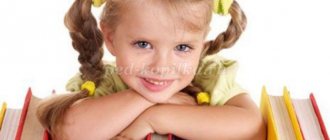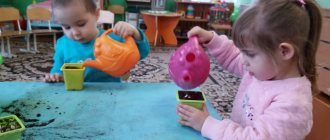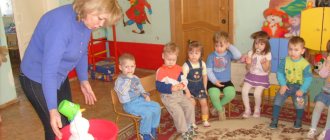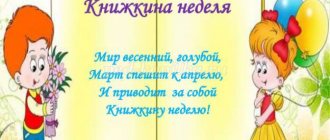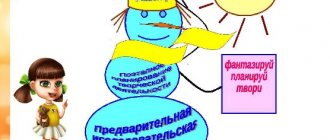“Being healthy is great!” Projects on how to instill this valuable thought in children.
Contained in sections:
- Healthy lifestyle, health. All about health for children 35988
- Projects. Project activities 66908
Includes sections:
- Vitamins. Projects 317
- Health Day. Projects 44
- Teeth, dental care. Projects 97
- KGN, hygiene. Projects 245
- Medicinal plants. Projects 135
- Microbes and viruses. Projects 48
- Health week. Projects 158
- Proper and healthy nutrition. Projects 372
- Profession doctor, clinic, hospital. Projects 98
- Human body, sense organs. Projects 78
By groups:
- Senior group
- Preparatory group
- Middle group
- Junior group
Showing publications 1-10 of 3516. All sections | Healthy lifestyle, health. Projects
New
Photo
The best
Musical and health project for children 5–6 years old “We play, dance, sing and grow healthy!” Musical and health project “We play, dance, sing and grow healthy ”
for
the ABC of
Health week in kindergarten.
Compiled and conducted by: Remizova I.A. - music director, Type of project : Physical education - music Duration: short-term - 1 week (03/19/2018 -...
Project “Being healthy is great!” for children of primary preschool age Relevance of the topic. Junior age is the most favorable time for instilling in a child the basics of motor culture, hardening, the habit of proper nutrition, compliance with cultural and hygienic standards, the need to receive positive emotions, i.e. the foundations of a healthy image...
project “Healthy family - healthy children”
Visual information forms
Organizations of communication between teachers and parents solve the problem of familiarizing parents with the conditions, content and methods of raising children in a preschool institution, allow them to more correctly evaluate the activities of teachers, review the methods and techniques of home education, and see more objectively the activities of the teacher.
Structural and functional model of a long-term plan for working with parents
consists of three blocks: information-analytical, practical and control-evaluative.
Information and analytical block
involves collecting and analyzing information about parents and children, studying families, their difficulties and requests, as well as identifying the family’s readiness to respond to the requests of the preschool institution. The tasks to be solved in this block determine the forms and methods of further work of teachers. These methods include: survey, questionnaire, patronage, interviewing, observation, study of medical records and special diagnostic techniques used mainly by psychologists.
The second block is practical
. It contains information aimed at solving specific problems related to children's health and development.
In order to monitor the quality and effectiveness of work with parents, a third block was introduced - control and evaluation.
Control and evaluation block
is an analysis of the effectiveness (quantitative and qualitative) of activities carried out by teachers.
To determine the effectiveness of efforts spent on interaction with parents, you can use surveys, feedback books, score sheets, express diagnostics, and other methods immediately after an event.
When working with parents, repeated diagnostics, interviews with children, observations, recording the activity of parents, etc. can be used to track and evaluate results.
One of the main tasks of preschool educational institutions is to strengthen the connection between everyday educational work with children and the process of raising a child in the family. Reasonable assignments, tasks, etc., which preschoolers should complete at home (but not repeat or copy what was done in the group), are aimed at increasing the independence, creative activity of children and activating adult family members.
The unique emotional atmosphere of family relationships, the constancy and duration of communication between children and adults in a variety of life situations, all this has a strong impact on an impressionable preschooler prone to imitation.
Very important for the formation of a child’s personality are the social beliefs of adult family members, relationships of friendship and mutual respect between them, and the ability of parents to organize meaningful life and activities for children. On this basis, pedagogically valuable communication between adults and children is created.
Pedagogical project “Grow up healthy, baby!”
Administration of the City District of Podolsk
Education Committee
Municipal preschool educational institution
general developmental kindergarten No. 10
Moscow region, Podolsk, st. Chistova, 13A, t. 8(4967) 53-52-65
e-mail: [email protected]
_____________________________________________________________________________
Pedagogical project for children of the second group of early age
“Grow up healthy, baby!”
prepared:
kindergarten teacher
kindergarten No. 10
Kazaeva S.V.
G.o. Podolsk 2022
Project “Grow up healthy, baby!” (second group of early age).
Compiled by Svetlana Kazaeva, teacher of MDOU d/c No. 10
G.o. Podolsk 2022.
Project type
: practice-oriented
Project type
: information and game
Project duration
: short-term
Project participants
: pupils of the second junior group, teachers, parents.
Objective of the project
: preserving and strengthening the health of children, introducing pupils and their parents to a healthy lifestyle.
Tasks:
1. Expand children’s understanding of personal hygiene items and rules
using them.
2. Cultivate neatness and the habit of taking care of your appearance.
3. To instill neatness in children, to instill cultural and hygienic skills and simple self-service skills.
4. Cultivate a desire to be healthy and take good care of yourself.
5. To form a desire to lead a healthy lifestyle, to give ideas about the value of health.
Expected results of the project:
— Preservation and strengthening of children’s health through a system of comprehensive physical education and health work;
— Creation of a subject-based development environment that ensures the effectiveness of health-improving work;
— Active involvement of parents in the physical education and health activities of preschool educational institutions;
— Improving independence skills in children while observing cultural and hygienic procedures.
— Formation in children and parents of the desire and desire to lead a healthy lifestyle.
Preliminary work
: looking at illustrations of objects
personal hygiene, creating game situations for using personal hygiene items, reading literary works about hygiene, guessing riddles.
Relevance of the project
Health is a priceless gift that nature gives to man.
A healthy child is characterized by harmonious, age-appropriate physical, intellectual, emotional-volitional, moral and social development. Preschool age is sensitive for the formation of the foundation of physical and mental health.
In early preschool age, there is intensive development of organs and the formation of functional systems of the body, the basic personality traits, attitude towards oneself and others are laid. It is important at this stage to form a knowledge base and practical skills for a healthy lifestyle in children.
Project “It’s good to be healthy” with children of senior preschool age
Ekaterina Podkolzina
Project “It’s good to be healthy” with children of senior preschool age
MUNICIPAL BUDGET PRESCHOOL EDUCATIONAL INSTITUTION CHILD DEVELOPMENT CENTER - KINDERGARTEN No. 58 “BELOCHOKA”
Project
«It's good to be healthy»
with
children of senior preschool age .
Prepared by: Podkolzina E. M.
Mytishchi 2022
Type of project : creative, educational - gaming
Project duration : long-term
Project participants :
Children's age : 5-6 years
Relevance: One of the main tasks of the Federal State Educational Standard for Education is the protection and strengthening of the physical and mental health of children . The formation of a healthy lifestyle begins from an early age . Preschool age is an important stage in children's lives, since it is at this age that the foundations of physical and mental health . Shaping the health of children must begin from childhood, because children want to learn something new, they are interested in everything. The most valuable thing a person has is health . Health is not only the absence of disease, but also mental and social well-being. In recent years, there has been a sharp deterioration in the health of children , therefore the main tasks for strengthening the health of children in kindergarten are the formation of their ideas about health as one of the main values of life, the formation of a healthy lifestyle . preschool children . Only we, adults, can solve this problem by creating conditions to preserve the physical, mental and social well-being of the child.
Problem: children have not developed the basics of a healthy lifestyle , cultural and hygienic skills (self-care skills)
.
The goal of the project : creating psychological and pedagogical conditions for the development and strengthening of children's health , introducing children and their parents to a healthy lifestyle .
Tasks:
— formation in children of a conscious attitude towards health and life ;
— accumulation of knowledge about health and development of skills to protect it;
— development of physical qualities;
— healing by means of hardening;
— organization of a health-preserving environment in preschool educational institutions ;
— ensuring the social and emotional well-being of a preschooler ;
— valeological education of parents.
Expected results:
Children:
— Increasing interest in a healthy lifestyle : the desire to do morning exercises, perform cultural and hygienic skills, play sports;
— Increasing the physical activity of children: involving all children in participating in outdoor games, performing physical exercises;
— Creating conditions for a child’s comfortable stay in kindergarten, taking into account a health-preserving and developmental environment .
Parents:
— Arouse parents’ interest in a healthy lifestyle and instill healthy habits in their children by personal example;
— Cooperation of parents and children in joint activities of the educational process.
Teachers:
— Enrichment of the subject-development environment;
— Organization and integration of all types of activities;
— Joint activities of the teacher, children and parents.
Project implementation stages :
Stage I: preparatory.
It was important to find out what knowledge the children have, what interests them, and where they can fill in the missing knowledge. What does a healthy lifestyle ? What should I do to find out?
- Read books;
- ask your parents;
- look on the Internet;
— survey of parents;
— monitoring;
— information for parents about the upcoming project , involving them in participation in the project ;
— development of an action plan on the project together with a physical education instructor;
— selection of fiction for reading, presentations, notes on educational activities, conversations, consultations for parents;
— selection of visual information material for viewing;
— selection of subject pictures, photographs, illustrations and musical works;
— work with methodological material, literature on this topic.
Stage II: practical.
September: topic “What is health ?”
A series of conversations and activities:
Conversation “I choose a healthy lifestyle ”
.
Goal: to form ideas about a healthy lifestyle : to cultivate a desire to take care of your appearance
(to form knowledge that nature is a source of health ).
Conversation “Keep your health ”
.
Goal: to arouse interest in physical education, to form an idea of the need to play sports.
Conversation “Vegetables and fruits are healthy foods”
.
Goal: introduce children to healthy products; explain how they benefit people.
Conversation “Vitamins and their role in human life”
.
Goal: to introduce children to the concept of “vitamins”, tell children that vitamins are necessary for health , and about healthy foods that contain vitamins.
Conversation “What is healthy food ”
.
Goal: To tell children that health depends on proper nutrition; teach children to eat properly (do not overeat, do not use harmful foods in their diet)
.
GCD "The ABC of Nutrition"
.
Goal: to teach children a healthy lifestyle : proper nutrition as one of the main conditions for children’s health .
Presentation “Harmful and healthy products”
.
Examination of illustrations on the topic “Vitamin experiments and experiments “Guess the taste”
,
"Acidity in foods"
.
Role-playing games: “Cafe”
,
“Vegetable and fruit store”
,
“Dining room”
.
Excursion to the catering unit.
Making little books “vegetables and fruits are healthy foods”
.
Modeling “Vegetables and fruits”
.
Didactic games “Where to find vitamins”
,
“4 extra”
,
“Find out by description”
,
“Edible - inedible”
,
“Fruits and berries in compote”
.
Drawing “Vegetables on a plate”
,
“Rolling up compotes”
,
“Fruit in a vase”
.
Interaction with parents:
— Consultation for parents “ Healthy eating – healthy child ”
;
— Help parents in selecting photo and video materials on the topic of the project .
Society:
Children's library "The ABC of Health "
.
Practical solution: exhibition “Vegetables and fruits - healthy products”
.
October: theme “Natural factors and our health ”
A series of conversations and activities:
Conversation “Sun, air and water are our best friends”
.
Goal: to form children's knowledge that nature is a source of health ; observe the rules of behavior in everyday life and in nature.
Conversation “Do exercises in the morning - you will be strong, you will be brave”
.
Goal: to tell children about the need to adhere to a daily routine, how this affects people’s ability to work and health .
Conversation “Make friends with water!”
Goal: to introduce children to K. Chukovsky’s poem “Moidodyr”
, to form in children ideas about the need to observe cultural and hygienic skills.
Conversation “Cleanliness is the key to health ”
.
Goal: to teach children to keep their appearance clean, tidy.
GCD using health-saving technologies “Grow Healthy ”
.
Goal: to form children’s ideas about a healthy lifestyle , about the factors that influence health , to teach the rules of safe behavior.
Presentation “My body”
.
Reading literary works and popular science literature (encyclopedia for children “Why”
, S. Mikhalkov
“Vaccination”
, proverbs, riddles.
Excursion to the medical center kindergarten office.
Solving crosswords and puzzles.
Making attributes for s/r games “Pharmacy”
,
"Hospital"
.
Didactic games “See, hear, feel”
,
“If you are sick”
,
“How to take care of your heart”
,
“Wonderful bag”
.
Outdoor games with manufactured attributes.
Making little books about a healthy lifestyle .
Interaction with parents:
— Drawing based on the fairy tale by K. Chukovsky “Moidodyr”
;
— Master class “ Health-saving technologies in working with children ”;
— Manufacturing of sports equipment for the FISO corner;
— Consultation for parents “Viruses and germs”
.
Practical solution:
— Morning exercises with parents;
— Leisure “Fire – friend or foe”
.
November: theme “Sport is health ”
Cycles of conversations and GCD:
Conversation “We play sports - we stock up on health ”
.
Goal: to make children want to play sports and move more; teach children to have a healthy lifestyle .
Conversation “Where do diseases come from”
.
Goal: explain to children that a sedentary lifestyle provokes many diseases; Promote a healthy lifestyle .
Conversation “ We want to be healthy ”
.
Goal: to teach children to take care of their health ; form healthy lifestyle ; develop motor skills and intellectual abilities.
NOD “What is sport for?”
Goal: To accustom children to physical activity, to promote the desire to play sports, to be strong , dexterous, and resilient. Teach to see the beauty of different sports.
NOD “Train to the Country of Health ”
Goal: to expand children’s ideas and knowledge about a healthy lifestyle , to make children want to lead a healthy lifestyle .
Looking at photographs and illustrations about health .
Presentation “Types of Sports”
.
Reading fiction: T. A. Shorygina “Save Veronica”
,
“Denis and Denny Bear”
, poems, riddles about sports.
Didactic games “I’ll start, and you finish”
,
“Who needs what”
,
“Correct the mistake”
.
"Children doing exercises"
.
"Sport"
Drawing:
Game self-massage of the face, ears, fingers.
Outdoor games: “Pass the ball”
,
“Jump with the ball”
,
“Throw the ball into the basket”
,
“The most accurate”
,
“Take it quickly.
Put it down quickly .
Interaction with parents:
— "Making a flower of health "
;
— Leisure “If you want to be healthy ”
;
— Participation of children in the GTO competition;
— Preparation for the holiday “ Health ”
.
Practical solution:
— Participation in the GTO competition for children from our group;
— Leisure “If you want to be healthy ”
.
December: theme “Mom, Dad, I am a healthy family !”
Cycles of conversations and GCD:
Conversation “Dress according to the weather - don’t get too cold”
.
Purpose: to explain to children that clothing protects a person from heat and cold, rain and wind. Teach children to take care of their appearance, to be neat and tidy.
Conversation “Dangerous situations”
.
Goal: to teach children to avoid dangerous situations, to understand that the deterioration of the environmental situation threatens human health .
Conversation “ A healthy mind in a healthy body ”
.
Goal: to explain to children that health is also a good mood . Teach children to be friendly to each other and help their peers.
GCD "Home Alone"
.
Reasoning - children's reasoning about health .
Reading fiction: T. A. Shorygina’s fairy tale “Exercise and a cold”
,
"Magic Walrus"
.
Didactic games “What we can’t live without”
,
“What will happen if the sun, water, etc. disappear?”
,
"Winter and summer sports games"
.
Looking at illustrations and paintings about a healthy lifestyle .
Drawing “Dad, Mom, I – a sports family”
.
Preventive gymnastics (breathing exercises, exercises for the eyes, posture, for flat feet)
.
Health-improving walking and running around the territory of the kindergarten (daily for a walk)
.
Outdoor games “Two Frosts”
,
“Sly Fox”
,
“We are funny guys”
,
“Mousetrap”
,
“Traps”
.
Interaction with parents:
— Holiday “ Health ”
;
— participation of the children of our group in the GTO competition: Bantikov Maxim, Kuyanova Anya, Danielyan Daniel, Tikhomirov Kostya, Berdykulova Ariana, Ikonnikov Platon, Kartashov Saveliy, Ezhova Milana, Konnov Kirill, Samusenko Artem;
— participation of our student Maxim Bantikov in the 12th Spartakiad among children of senior preschool age in preschool educational institutions of the Mytishchi city district;
— participation of the Bantikov family in the regional competition “Mom, Dad, I am a healthy family ”
.
Stage III: final.
Summing up the results of the project (questioning parents)
.
Project presentation
Project results :
1. Children’s development of basic ideas about a healthy lifestyle ;
2. Formation of habits of daily physical activity;
3. Children’s of knowledge about the rules of behavior in nature and in everyday life;
4. Improving physical fitness indicators of children;
5. Awareness by children and parents of the need and importance of a healthy lifestyle .
As part of the project, children received knowledge about a healthy lifestyle , they formed ideas about themselves, their health and physical culture. And the desire of children and their parents to lead a healthy lifestyle and give up bad habits will allow their parents to see their children healthy and happy , which is very important for their future life.
Healthy lifestyle, health. Projects - Project in the middle group “We are for a healthy lifestyle!”
Publication “Project in the middle group “We are for a healthy image...” General information about the project By number of participants: group By duration: short-term (1 week) Type of project activity: educational and gaming Project participants: parents, children, teachers Relevance. Health is one of the most important factors in our lives!…
Image library "MAAM-pictures"
Project “Health is Great!” Project implementation plan. Event Objectives Implementation deadlines Preparatory stage 1. Setting goals, determining the relevance and significance of the project. 2. Selection of methodological literature for the implementation of the project (magazines, articles, abstracts, etc. 3. Selection of visual and didactic…
Information and communication technologies in preschool educational institutions. Project “Know yourself and preserve your health” Guidelines for working with the project “Know yourself and preserve your health” Author of the project: Malakhova Elena Sergeevna Educator. GBDOU kindergarten No. 138, Vyborg district of St. Petersburg. The project was created using interactive technologies Mimio Studio, contains 16 pages....
Project “Healthy children in a healthy family” in the senior group Pedagogical project of the senior group “Vasilyok” on the topic: “Healthy children in a healthy family” Type of project: informational, practice-oriented Project participants: teachers, children of the senior group “Vasilyok” and their parents . Project implementation period: short-term November 2022. 1…

